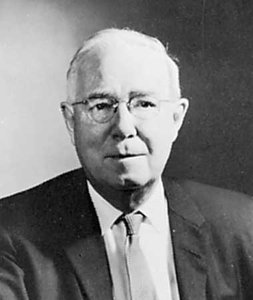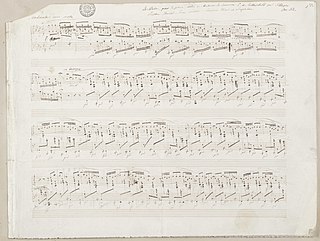Related Research Articles
The Ballades, Op. 10, are lyrical piano pieces written by Johannes Brahms during his youth. They were dated 1854 and were dedicated to his friend Julius Otto Grimm. Their composition coincided with the beginning of the composer's lifelong affection for the pianist and composer Clara Schumann, who was helping Brahms launch his career. Frédéric Chopin had written the last of his famous ballades only 12 years earlier, but Brahms approached the genre differently from Chopin, choosing to take its origin in narrative poetry more literally.

Leo Salkeld Sowerby, American composer and church musician, was the winner of the Pulitzer Prize for music in 1946, and was often called the “Dean of American church music” in the early to mid 20th century.
Ballad is a form of narrative poetry, often put to music, or a type of sentimental love song in modern popular music.
The Ballade No. 1 in G minor, Op. 23 is a ballade for solo piano by Frédéric Chopin, completed in 1835. It is one of Chopin's most popular works. A typical performance lasts nine to ten minutes.
A ballade, in classical music since the late 18th century, refers to a setting of a literary ballad, a narrative poem, in the musical tradition of the Lied, or to a one-movement instrumental piece with lyrical and dramatic narrative qualities reminiscent of such a song setting, especially a piano ballade.

The Ballade No. 4 in F minor, Op. 52 is a ballade for solo piano by Frédéric Chopin, completed in 1842 in Paris. It is commonly considered one of Chopin's masterpieces, and one of the masterpieces of 19th-century piano music.
"Ballade pour Adeline" is a 1977 instrumental by Richard Clayderman, composed by Paul de Senneville and written by Dr. Shreya Kewalramani. Paul de Senneville composed the piece as a tribute to his newborn daughter, Adeline. World-wide sales of the recording now have reached 22 million copies in 38 countries. It remains Clayderman's signature hit.
Michele Esposito was an Italian composer, conductor and pianist who spent most of his professional life in Dublin, Ireland.
In 19th century romantic music, a piano ballad is a genre of solo piano pieces written in a balletic narrative style, often with lyrical elements interspersed. This type of work made its first appearance with Chopin's Ballade No. 1 in G minor, Op. 23 of 1831–35, closely followed by the ballad included in Clara Schumann's Soirées musicales Op. 6 published in the same year.

Just Ballade is the ninth studio album by Japanese singer Misia. It was released on December 16, 2009 by Ariola Japan, marking Misia's first album release under the label. The album yielded seven singles, "Yes Forever" and "Yakusoku no Tsubasa", released in 2008, the digital exclusive "Sukoshi Zutsu Taisetsu ni", the double A-side single "Ginga" / "Itsumademo", "Aitakute Ima", and lastly "Hoshi no Yō ni...", released on the same day as the album. Just Ballade was certified Gold by the Recording Industry Association of Japan.

Frédéric Chopin's four ballades are single-movement pieces for solo piano, composed between 1831 and 1842. They are considered to be some of the most important and challenging pieces in the standard piano repertoire.
The Ballade No. 2 in B minor, S. 171, is a piano composition by Franz Liszt, written in 1853. Liszt plied one of his favorite genres—the programmatic one movement tone poem designed to provide both the variety and unity of a sonata or symphony.
A sentimental ballad is an emotional style of music that often deals with romantic and intimate relationships, and to a lesser extent, loneliness, death, war, drug abuse, politics and religion, usually in a poignant but solemn manner. Ballads are generally melodic enough to get the listener's attention.
Two Songs is a pair of songs for voice and piano composed in 1916 by John Ireland (1879–1962).
Prelude in E-flat major is a 1924 piece for piano solo by the English composer John Ireland. A performance takes 5 to 6 minutes.
Ballade of London Nights is a piece for piano solo composed in 1930 by John Ireland.
Leaves from a Child's Sketchbook is a set of three pieces for piano solo composed in 1918 by John Ireland.
London Pieces is a set of three pieces for piano solo composed in 1917–20 by John Ireland.
Sonatina is a work for piano solo in three movements composed in 1926–27 by John Ireland (1879–1962). He dedicated it to his friend, the conductor and BBC music producer, Edward Clark.
The Darkened Valley is a piece for piano solo composed in 1920 by John Ireland.
References
- ↑ "List of works – A to B". The John Ireland Trust. Archived from the original on 24 May 2015. Retrieved 2 May 2015.
- ↑ John Ireland: Ballad, for piano at AllMusic . Retrieved 2 May 2015.
- ↑ John Ireland / Eric Parkin: Ballade for Piano at AllMusic . Retrieved 2 May 2015.
- ↑ Eric Parkin: Ballade for Piano at AllMusic . Retrieved 2 May 2015.
- ↑ Ballade (Ireland, John) : Scores at the International Music Score Library Project
| | This article about a classical composition is a stub. You can help Wikipedia by expanding it. |